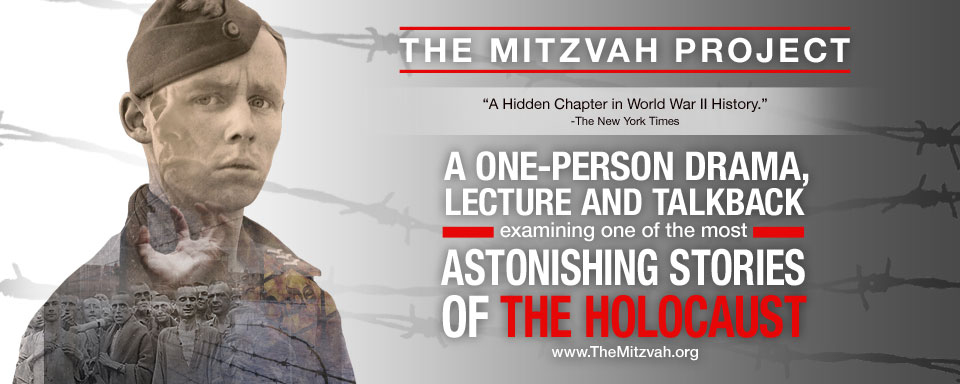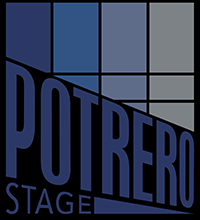The Mitzvah Project

The Mitzvah Project
The Mitzvah Project is a fiscally-sponsored project of PlayGround (Federal ID 94-3336399), a California not-for-profit corporation. All donations are tax-deductible to the extent allowed by law. To donate online, click the button above. To donate by mail, send checks payable to PlayGround (add “The Mitzvah Project” in the memo section) to: 3286 Adeline Street #8, Berkeley, CA 94703-2485.
The Mitzvah Project is a three-part Holocaust-themed production that is being presented at local high schools and colleges by actor/writer Roger Grunwald and Mitzvah Project Teaching Artists. Comprised of a short play, lecture and talkback, The Mitzvah Project asks several critical socio-historical questions: “Who decides the meaning of culture, race and ethnicity?” “How is one’s identity determined?” “Why do we demonize ‘the other?’”
The first part of the presentation, The Mitzvah, is a one-act, one-person drama.1 It was adapted by Grunwald into a full-length Holocaust drama entitled I Died in Auschwitz (originally known as The Obligation) that premiered in San Francisco in 2017 with a follow-up production in 2018. The Mitzvah dramatically explores the nature of prejudice through the interconnected lives of a Polish-Jewish Auschwitz survivor and a half-Jewish Wehrmacht officer who cross paths during the darkest days of the Holocaust.
“The Mitzvah Project is an inspiring presentation that goes into the heart and complexity of current issues of prejudice, bullying, racial tension, genocide and war, presented within the historical context of The Holocaust.” — Mónica Olague-Marchán, Ph.D., Inclusivity Leader / Family Liaison, Catholic Memorial High School, Waukesha, WI
Mission
The Mitzvah Project is designed to be a living history lesson leveraging the power of performance and personal history to touch and teach young people.
“The Mitzvah Project should be required viewing for anyone wishing to learn about a nearly-silent chapter of Holocaust history. People will be forced to take a deep look inside themselves to determine the nature of their hearts, and just what we would do at any cost to try and stay alive.” — Dr. Rick Halperin, Director, Embrey Human Rights Program, Southern Methodist University, Dallas, Texas
As a classically trained actor and the proud son of an Auschwitz survivor, Grunwald’s obligation is to make sure that, with his mother’s generation dying out, the world does not forget.
“Roger Grunwald manages to combine art and history in his dazzling performance of The Mitzvah Project. Seldom have I witnessed the ability of an actor to infuse characters with such passion and clarity so as to make time travel a reality… Today, when events unfold with terrifying velocity, it’s critically important to remember the past. Just one of the many reasons not to miss Roger’s mission and mastery.” — William S. Cohen, Former United States Senator/Secretary of Defense
Need
“We must acknowledge — and commit to filling — the void in Holocaust education that is being left by the passing of the survivor generation,” says Grunwald. “We are facing several incontrovertible and disturbing facts. According to a recent Claims Conference study, ‘forty-one percent of Americans, and 66 percent of millennials, cannot say what Auschwitz was’ and, as Steven Spielberg rightly lamented, Holocaust education is currently ‘not a pre-requisite to graduate high school, as it should be. It should be part of the social science, social studies curriculum in every public high school in this country.’”
History
The Mitzvah Project is inspired by and is in homage to Grunwald’s mother who used her Holocaust experience as a tool for teaching the lessons of history to young people. Over the years, Grunwald has presented The Mitzvah Project at over 80 venues and institutions in 24 states, the U.K., Canada and Israel, including Stanford and Oxford Universities, Hebrew University, the University of Pennsylvania and the Illinois Holocaust Museum and Education Center in Skokie. He has also presented The Mitzvah Project for high school students in Nebraska and Wisconsin and performed I Died in Auschwitz for students from Lick-Wilmerding, the Waldorf School, the French American International School and Sacred Heart Cathedral Prep in San Francisco.
“Next to survivor testimony, this is one of the most powerful ways to keep the stories of Holocaust alive.” — Eileen O’Kane. History Department/Ethics Co-Chair, Lick-Wilmerding High School
“Grunwald is a masterful story-teller. I Died in Auschwitz is spectacular and so relevant for young people, especially for high school students for whom full rights of citizenship are just a few years – or months – away…” – Michelle Haner, Theater Instructor at the French-American International School
“I Died in Auschwitz is not only a theatrical masterpiece, but also a profound learning opportunity for high school students… It is a powerful tool to keep the memories of the Holocaust alive in the minds of our youth.” — Ismael Ruiz, Instructor, Religious Studies, Sacred Heart Cathedral Prep
“Roger Grunwald is a phenomenon. In the course of little over an hour he manages to bring up issues that are profound. He does that with humor, intelligence and an obvious knowledge of the material that he is presenting. He is an actor of extraordinary versatility. I have never seen anything like I Died in Auschwitz.” — Peter Kenez, Ph.D., Professor of History, Emeritus, University of California, Santa Cruz
Characters in The Mitzvah
A Polish-Jewish Auschwitz survivor; a half-Jewish Wehrmacht First Lieutenant and a Groucho Marx-esque American-Jewish comedian-cum-social critic (the play’s Chorus) who leavens the drama with acerbic commentary, probing the boundary between the absurd and the horrific.
Part 2 of The Mitzvah Project: The Lecture
Early on in his talk, Grunwald explores ways in which the Holocaust – and being the son of two German Jews – shaped him as a boy, teen and young adult. He examines the unique history that produced tens of thousands of half and quarter Jewish Wehrmacht soldiers who were the product of two centuries of German-Jewish assimilation, intermarriage, conversion and the striving of a people committed to calling the German Fatherland their home. He segues to American history and reveals the role that America’s Jim Crow Laws played in providing a model for the Nuremberg Laws. He refers to the recent upsurge of white supremacism and intolerance and discuss how prejudice has been manifesting itself around the country including, and most alarmingly, in our schools. The last section of his talk examines how advances in human biology and genetics totally debunk racialist mythology.
1 The Mitzvah was created in collaboration with his original director, Annie McGreevey.
